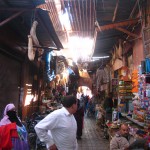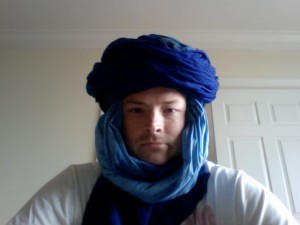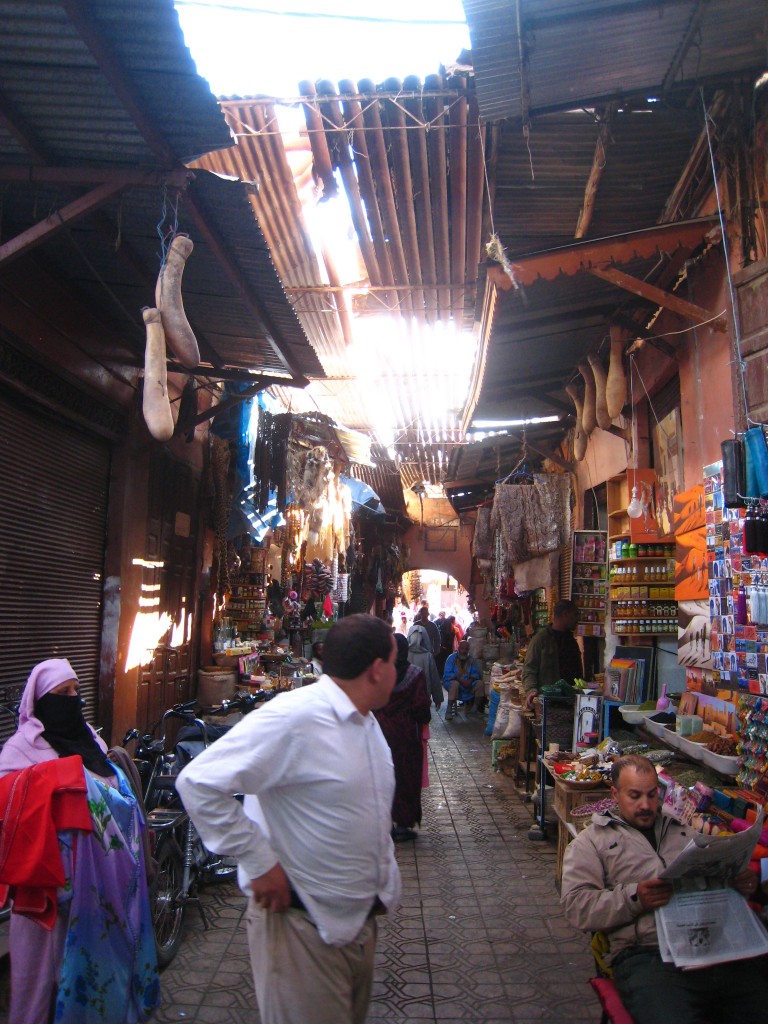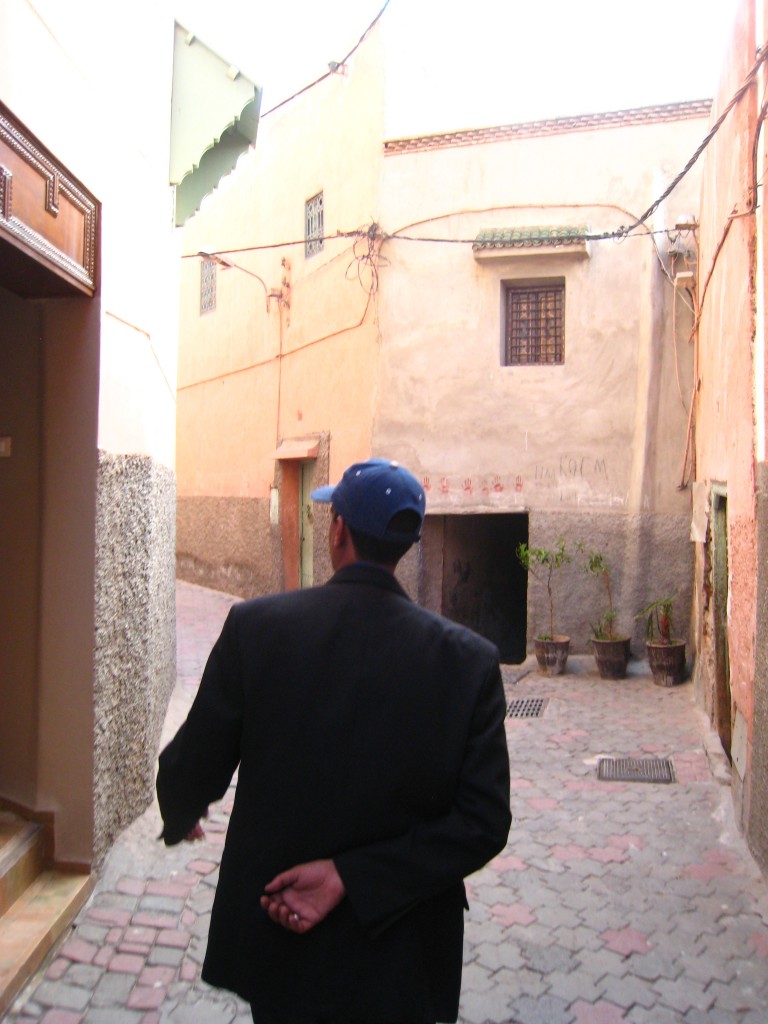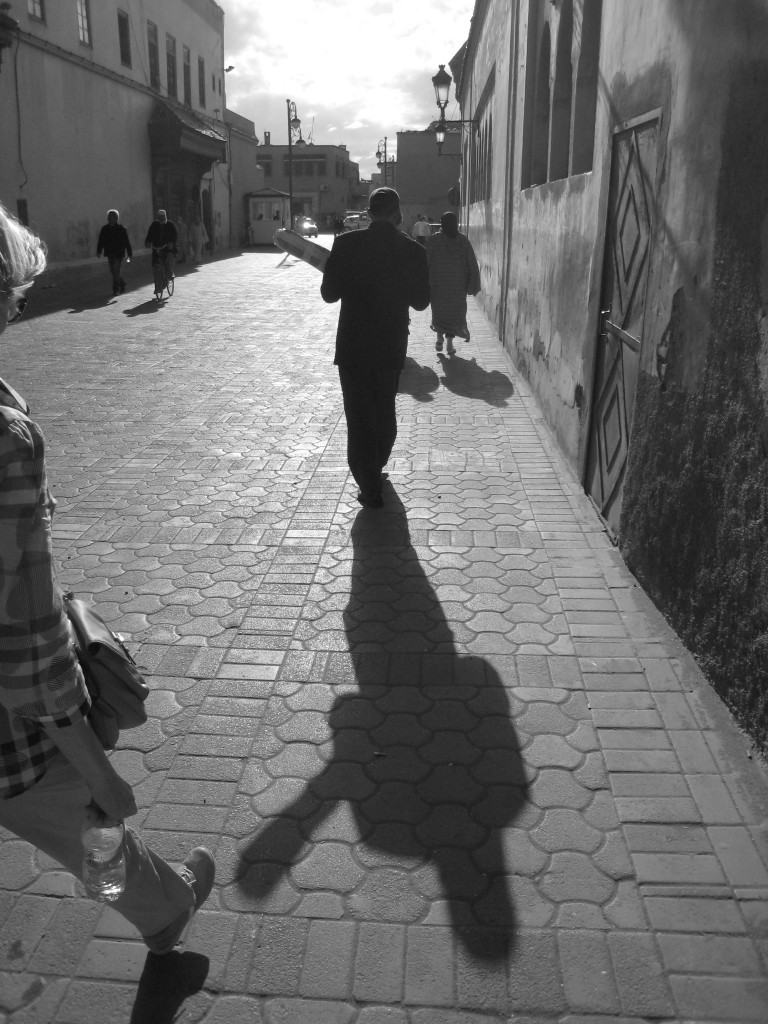I’m wandering through the Marrakech Medina, completely guide-free. The reason I mention the “guide-free” is because it’s a whole different experience when you don’t have someone scaring off the touts. It’s borderline awful actually, not having a guide; almost like having an entourage.
I’m on a quest to find a Tuareg knife. They are like pieces of jewelry, encrusted with bits of blue tile, the color for which they are known. I’ve sort of become—without anyone claiming me as such—an adopted member of this fierce nomadic tribe that is famous for their head to toe blue robes. In fact, at this moment, in what in hindsight I will see as an obviously bad idea, I am wearing a blue turban. As turbans go, this one is very large. Unwrapped and spread out on the floor its 30 feet long; wrapped around my head repeatedly, the end result resembles a giant upside down blue salad bowl. No matter. I enjoy it.
“My friend! My friend! My friend!” Everyone is your friend in Morocco. Morocco is one large long con of a country: everyone knows everyone and they’re all out to hoodwink you out of a few dollars. Each guide works with certain stores within the medina from which they get a commission.
The Medina is a labyrinth, created originally to confuse and frustrate an enemy, with its dead ends and narrow serpentine alleys. Close up all the doors and turn out the lights and an army could bumble around within its walls for generations.
After a while I give up and allow a man named Mustafa to lead me to the Tuareg knife section of the medina. I had been walking in circles, passing the same stalls and red lamps for half an hour. The Medina is very organized and each good has its own section: leather jackets, scarves, turbans, pottery, the tannery, shoes, lamps, poofs (leather stools), spices, poultry, sheep heads—everything has its own place.
Mustafa leads me around and up and over and through and down and who knows where all, and finally we come to a dark shop filled to the rafter with all manner of ancient cutlery. There are knives and swords and walking sticks that are really swords and old muskets and gunpowder boxes. The place is packed floor to ceiling save for a small area where the owner sits.
The owner, a small wiry man with a white goatee and coke bottle glasses, who is convinced that I am his friend, offers me mint tea. (Nothing happens in Morocco without mint tea.) His name is Muhammad. I offer my hand and we shake. Mustafa says something to him in Arabic and the little man darts away. He comes back with a large assortment of visually stunning steel. The sword is fine, but it’s the hilt and ornate stainless steel and blue tiled scabbard that draw the eye. In the darkly lit dusty interior of the store, though, it’s hard to make out all the details being brought to my attention.
Mustafa is every bit as enthusiastic as the salesman. “Look at this is what he is saying!” “And now look at this!” “My friend, he is wanting you to also have a look at this!” We move beyond swords to things I have made no mention of whatsoever, like jewelry boxes and musical instruments and old padlocks, things he has actually gone off to other stalls to bring forth. The stuff is piling up on the small counter and the little man is a whirlwind of activity and it’s all but impossible to keep up. He is looking intently at me, and every time I make eye contact he thinks of something special that would be perfect just for me.
“I think there’s enough to look at,” I tell Mustafa. He whispers into Muhammad’s ear and Muhammad runs off to get more stuff.
Haggling is a big deal in this part of the world. It takes a lot of patience and theatrics and feints towards the door. The feints towards the door are not really feints at all. I really am exhausted by the process and intensity of the transaction. I’m sweating and regretting the whole enterprise, and if I thought I had any idea where I was or thought I could find my way out of the Medina’s maze, I would just leave.
Haggling involves two sides, neither of which wants to meet in the middle, because they both have different ideas on where the middle is. I tell Mustafa I only want to buy one knife. Muhammad responds by suggesting I buy five knives, a couple of swords, a walking cane, a snuff box, two padlocks, three tent pegs, and a jewelry box, for which he hopes I will pay “only six thousand American dollars!”
And so it goes. And goes. And goes. Finally, excruciatingly, after hours of back and forth, my eyes burning from blue turban dye, we agree that I will buy two knives and a jewelry box for a little over a hundred dollars.
Muhammad, who only moments ago looked like he wanted to pry my eyes out with a spoon, is now beaming, and pouring me more Mint Tea. Now that it’s over, I, too, feel a little post-transaction euphoria. We’re like two boxers hugging in the middle of the ring after a long bout.
“Maraki!” he tells me, “You Maraki!”
“He says you haggle like a local. Big compliment!” Mustafa says.
Mustafa walks me back to my hotel and refuses any offer of a tip. (That’s because of the commission Muhammad paid him to guide me to his shop.) I am worn out by the experience and shake Mustafa’s hand and watch him disappear in the distance and into the crowd.
That night I show off my wares. “I’d say these are a couple of weeks old at least,” my guide tells me. (I had been told they were priceless antiques.) “You should have let me go with you. I would have beaten a good price out of them!”
“It’s okay,” I say. I was thinking about the experience. Two weeks old or not, they are still well made (Moroccans are master craftsman); besides, the experience was what it was all about. The Mint Tea wasn’t bad either.

